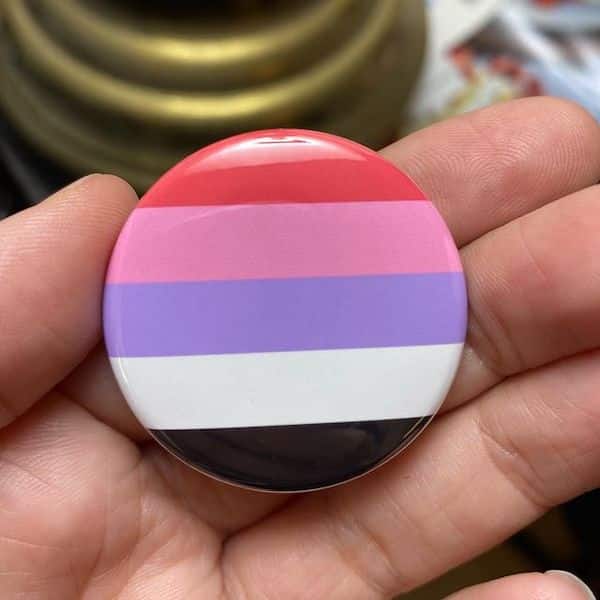Have you ever felt like the way you experience attraction isn’t quite the same as most people? Are you only ever attracted to people whom you know are attracted to you as well? If that is the case, there may be a name for how you feel: reciprosexual. Here, we explain everything you need to know about what it means to be reciprosexual, from its definition to what it’s like to identify as such.
RELATED | What Does Cupiosexual Mean?
Reciprosexual: Meaning And Origin Of The Term
Reciprosexual people are those who only experience sexual attraction when they know that the other person is sexually attracted to them. The term is rooted in the word “reciprocate”, which means “to give and take mutually” or share the same feelings with someone.
Reciprosexual people can be gay, straight, bisexual, or otherwise. It can be a standalone sexual orientation or be combined with other orientations. That said, reciprosexual is a micro-label that falls on the wide asexual spectrum.

What Is The Asexual Spectrum?
Wait, asexual spectrum? Micro-label? If those terms have left you with even more questions than answers, don’t worry. We’re here to shed light on those concepts.
The asexual spectrum (or ace-spec) describes a range of orientations or identities for people who experience varying degrees of sexual attraction. Some asexual people feel no or very little sexual attraction, while others only experience sexual attraction under certain circumstances.
Micro-labels exist to provide asexual people with the language to communicate their boundaries, needs, desires, and capabilities in the bedroom. These labels help asexual people understand what they’re willing to give or take in their relationship and help them navigate their place within the ace community.
For instance, a gray-asexual person may experience sexual attraction from time to time but have a low sex drive. Meanwhile, demisexual people can only experience sexual attraction for people with whom they’ve formed a strong emotional bond. Cupiosexual people may not experience sexual attraction but have a desire to engage in sexual activities or be in a sexual relationship.
How do personal attitudes toward sex further define us?
On top of this, there are different personal attitudes and comfort levels when it comes to sex. The Asexual Visibility & Education Network (AVEN) breaks it down as so:
- Sex-favorable: This describes people who have a “positive willingness” to engage in sexual activity, albeit with some compromises. Some sex-favorable people may find that, although they don’t enjoy receiving it, they do enjoy giving sexual stimulation.
- Sex-indifferent: This describes people who do not seek out sexual experiences or find sex particularly enjoyable but are not repulsed by the idea of engaging in it as well. They could be open to trying new things in the bedroom, depending on the partner, the circumstances, or how they’re feeling at the time. However, sex doesn’t bear much weight in how they approach relationships.
- Sex-averse: For these types of people, sex is not only unpleasant but is something they hope they don’t have to experience at all.
- Sex-repulsed: These are people who find the mere idea of engaging in sex disgusting. While sex-averse people may not find sex enjoyable, many sex-repulsed people get uncomfortable at the mere thought of sex.
So, where do reciprosexual people fit into all of this? Again, there is no one way to be asexual, as is there no one way to identify as reciprosexual. But, for the most part, reciprosexual people may be sex-indifferent or sex-averse to most people – that is, until they find out that the other person is attracted to them.

How Do I Know I’m Reciprosexual?
There isn’t a lot of reciprosexual representation out there, and it’s not as well-known as being gay or bisexual is. So, how do you know if you’re reciprosexual? The following signs could help you discover whether you might be reciprosexual:
- You rarely feel sexually attracted to others.
- You only start to feel attracted to someone once you find out they’re attracted to you.
- You rarely feel compelled to initiate conversations or make the “first move” with others.
- You’re only interested in sex if there is a specific person involved, and you already know that they feel positive about you.
- You can’t quite relate to the way romances pan out in films, books, and TV shows.
- You feel like you can relate more to asexuals than allosexual people but don’t feel sex-averse or sex-repulsed.
- The term “reciprosexual” just feels like a good fit.
What Is The Reciprosexual Flag?
There is no official reciprosexual flag, but there are several proposals out there. One of the most popular flags is a five-striped flag that resembles the asexual pride flag. It consists of the colors pink, light pink, lilac, white, and black.
Some sources say that the pink stripe on top represents attraction, while the white stripe represents a lack of attraction. Meanwhile, the black stripe stands for asexuality, and the lilac stripe stands for the ace community.

Final Thoughts
So, what does it mean to be reciprosexual? In short, reciprosexuals are people who can only be attracted to those who reciprocate their feelings.
Do you relate to this term? Or do you feel like your identity falls elsewhere on the asexuality spectrum? Feel free to explore our site to learn more about other ace-spec identities!
RELATED | What Does It Mean To Be Aroace?


